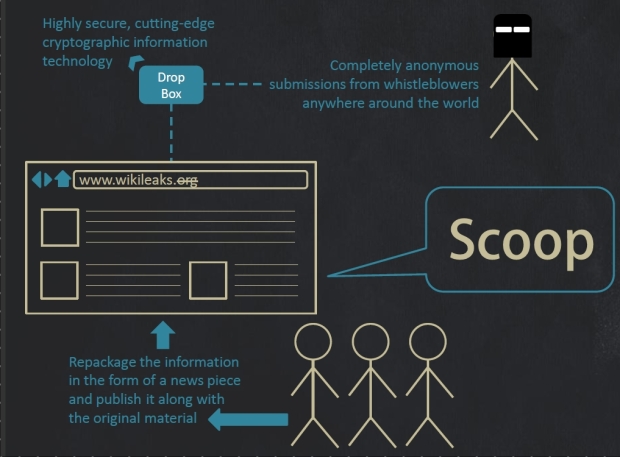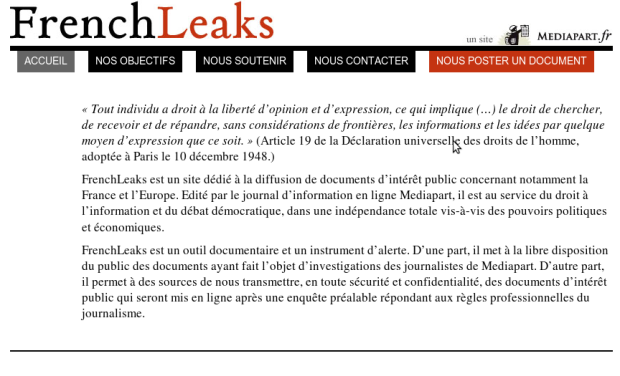Posts Tagged Julian Assange
WikiLeaks: provider of good or bad truths ?
Posted by catherineburki in Technology on December 18, 2011
Using new technologies to disclose the truth. That’s the big mission of WikiLeaks. But is that really a good idea?
Born of the uncountable possibilities offered by the development of new technologies, WikiLeaks created kind of a new way to make journalism. Julian Assange, creator of wikiLeaks, explained, in an article published in “The Autralian”: “WikiLeaks coined a new type of journalism: scientific journalism. We work with other media outlets to bring people the news, but also to prove it is true. Scientific journalism allows you to read a news story, then to click online to see the original document it is based on.” As you probably know, WikiLeaks takes care of the online part of this scientific journalism. If you go to WikiLeaks‘ website, you will find an incredible amount of documents about all kinds of topics and made up of raw data. WikiLeaks doesn’t provide analyse, it just publish data on its pure state.
With this way of working, WikiLeaks wants to make possible and promote the total population’s information about all facts that can affect them. That’s really the first mission of WikiLeaks.
Internet, a provider of truth
“The idea was to use internet technologies in new ways to report the truth”, said Julien Asange to “The Australian”. And it is exactly what he did. He knew taking advantage of the big evolution of new technologies, and particularly posibilities offered by the Web 2.0, to create a new form in informations publication.
Web 2.0 philosophy is to implicate the internet user, make them become an actor in the Internet universe. Julian Assange, by Web 2.0 and WikiLeaks’ website, decide to permit the citizen to become a real actor of the information transmission process. Simple citizen like you and me can send an information to WikiLeaks. And this with guarantee of total anonymity. Somebody in possession of relevant and maybe secret information (maybe not like you and me this time) can then send them to WikiLeaks’ website. It’s a good way to make appear important and secret truths.
WikiLeaks delight and disturb
This is a new way to deal with informations. A kind of journalism which supplies an incredible amount of raw and important informations all around the world. But do you tkink this is really a good idea? Has the population to know everything? Isn’t this new kind of journalism on Internet dangerous? These questions are actively discussed in the society. And I suppose you already have your own opinion about the subject. But nevertheless, I will now expose main arguments of defensors and detractors of WikiLeaks.
First, let me begin with detractors. The apparition of WikiLeaks, its functioning using internet and its absolute search of truth provoked a real wave of protests. Lots of people, and particularly governments, denounced the activities of WikiLeaks. According to the website Opendemocracy.net , the diffusion of different data, like for example the amercian Cablegate, disturbed political establishment. This one accuse WikiLeaks of treason and putting lives and states in danger by publishing informations classified top secret. Joe Lieberman, american senator, even considered that “The disclosure of these diplomatic cables is nothing less than an attack on the national security of the United States, as well as that of dozens of other countries.”
Considering these arguments, we can notice that the power of WikiLeaks really frightens. Moreover, in their fight against WikiLeaks, governments and other detractors have finally succeed in imposing silence on WikiLeaks. This by provoking a financial freeze.
But nevertheless, there is always a lot of people who approve the initiative of WikiLeaks. “WikiLeaks is a publisher and a journalistic entity”, assert the journalist Mathew Ingram on Gigaom blog. And according to the International Principles of Professional Ethics in Journalism, all kind of media have the duty to inform the population about the reality of the society. It’s exactly what WikiLeaks does.
The founder of Mediapart Edwy Plenel also underlined, in an article titled “En défense d’Internet et de WikiLeaks“, the important contribution of WikiLeaks to the protection of the democracy. A total transparency about the governments’ facts and decisions will impose a good and fair way to govern. According to Edwy Plenel, WikiLeaks participate to the vitality of the information world and has legitimacy to exist. It confer much power to these new journalists on their quest for the truth and it’s a good point.
Totally convinced by the merits of WikiLeaks, Edwy Plenel created on march 2011 FrenchLeaks. A french website working the same way as WikiLeaks.
A complex question
Then, finally, who is right? On the one side, we have the need of information to guarantee a good and fair society. On the other side, we have the fear of putting the society in danger. What’s the most important? A hard question.
I think that now, the society has to reflect about the role of journalists. The development of new technologies created new possibilities for journalists to make their job. But do they have to use all of this possibilities or do they have to put limits? Do they can disclose all truths? And finally, is the development of Internet always a good thing, or does it provide too dangerous possibilities?
In my opinion, it’s important that the society, and particularly futur journalists like us, take time to think about these topics. In this short text, I just give a general panaroma about this subject. We have now to tkink about it and discuss it together. Then, you, what do you tkink?
One more post about Wikileaks
Posted by FF in Technology on January 10, 2011
At the time the choice of topics had to be made for this assignment, Wikileaks was not as a common and well-known word as it is three months later. By now, imagining a time, where not every living person has actually heard of Wikileaks and its founder Julian Assange, seems rather strange.Subsequently, the triage of the information has been quite challenging, since last October and the avalanche of news and chatter the multiple revelations and scandals related to the subject (see image: Google Trend for the search term “wikileaks”).
It is nevertheless a pleasure to wander around the multitude, to let yourself being carried away by the flow of blog posts and comments, to try to follow most of the countless links you encounter and, at some point, just to stop for a moment, look where you have landed, and actually read what lies before your eyes. For example: “we understand the fears that can be generated before an informative abyss like the one we face with the Wikileaks case”, a sentence from the homepage of look4leaks.net. This site is ranked 2’084’048th by Alexa, with no reported links to it. The 1 million dollar question being: how did you end up on this page ?
Now that the introductory remarks are completed, let’s come to the point. The original concern leading to the present post, which made sense at the time, was whether Wikileaks could be considered as a reliable source of information for journalists or not. The fact that five of the most internationally renowned newspapers and newsmagazines – The New York Times, El Pais, Le Monde, The Guardian and Der Spiegel – all agreed to collaborate with the Wikileaks to release gradually around 250’000 embassy cables, clearly assets the credibility of the documents the organization provided. And this even if the Indian congress showed some suspicion.
 Moreover, the other initial interrogation concerning Wikileak’s ability to protect its sources, is not really issue, since it turned out every revelation regarding the US military had one single source, Bradley Manning a 22 years old military data analyst (see picture, source: wired.com). The news of his arrest was first reported by the magazine Wired:
Moreover, the other initial interrogation concerning Wikileak’s ability to protect its sources, is not really issue, since it turned out every revelation regarding the US military had one single source, Bradley Manning a 22 years old military data analyst (see picture, source: wired.com). The news of his arrest was first reported by the magazine Wired:
Manning came to the attention of the FBI and Army investigators after he contacted former hacker Adrian Lamo late last month over instant messenger and e-mail. Lamo had just been the subject of a Wired.com article. Very quickly in his exchange with the ex-hacker, Manning claimed to be the Wikileaks video leaker.
[…]
From the chat logs provided by Lamo, and examined by Wired.com, it appears Manning sensed a kindred spirit in the ex-hacker.
[…]
When Manning told Lamo that he leaked a quarter-million classified embassy cables, Lamo contacted the Army, and then met with Army CID investigators and the FBI at a Starbucks near his house in Carmichael, California, where he passed the agents a copy of the chat logs. At their second meeting with Lamo on May 27, FBI agents from the Oakland Field Office told the hacker that Manning had been arrested the day before in Iraq by Army CID investigators.
The events leading to Bradley Manning’s arrest had thus nothing to do with Wikileaks capacity to protect its sources. And there have been no reports of other source’s identity getting unveiled or threatened so far. Assange furthermore declared at an event in London, that:
“We never know the source of the leak, as our whole system is designed so that we don’t have to keep that secret. It’s very, very hard when your adversary is a modern state intelligence agency to keep a secret. But if you don’t collect the secret in the first place, then you don’t have to keep it.”
(source: aolnews)
The most serious reproach, one could address Wikileaks, aside from the debate whether the documents should have been published or not, has to do with the lack of transparency in the organization’s functioning, and the extensive publicity around the personality of Julian Assange. These criticisms were relayed inside the organization, when Daniel Domscheit-Berg, former Wikileaks spokesman, expressed his concerns in the Swedish documentary film WikiRebels:
“If you preach transparency to everyone else,you have to be transparet yourself, you have to fulfill the same standards that you expect from others”
 He also announced the creation of a new platform, openleaks.org, which, he assured, would attach a lot of importance to transparency. One quick look at the Twitter account of this organization, now one month old, shows that it is transparent indeed.
He also announced the creation of a new platform, openleaks.org, which, he assured, would attach a lot of importance to transparency. One quick look at the Twitter account of this organization, now one month old, shows that it is transparent indeed.



